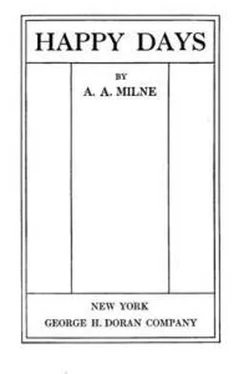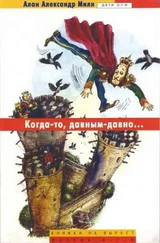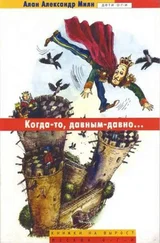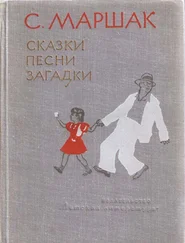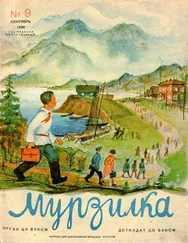Алан Милн - Happy Days
Здесь есть возможность читать онлайн «Алан Милн - Happy Days» весь текст электронной книги совершенно бесплатно (целиком полную версию без сокращений). В некоторых случаях можно слушать аудио, скачать через торрент в формате fb2 и присутствует краткое содержание. Год выпуска: 2014, Издательство: epubBooks Classics, Жанр: Юмористическая проза, на английском языке. Описание произведения, (предисловие) а так же отзывы посетителей доступны на портале библиотеки ЛибКат.
- Название:Happy Days
- Автор:
- Издательство:epubBooks Classics
- Жанр:
- Год:2014
- ISBN:нет данных
- Рейтинг книги:5 / 5. Голосов: 1
-
Избранное:Добавить в избранное
- Отзывы:
-
Ваша оценка:
- 100
- 1
- 2
- 3
- 4
- 5
Happy Days: краткое содержание, описание и аннотация
Предлагаем к чтению аннотацию, описание, краткое содержание или предисловие (зависит от того, что написал сам автор книги «Happy Days»). Если вы не нашли необходимую информацию о книге — напишите в комментариях, мы постараемся отыскать её.
Happy Days — читать онлайн бесплатно полную книгу (весь текст) целиком
Ниже представлен текст книги, разбитый по страницам. Система сохранения места последней прочитанной страницы, позволяет с удобством читать онлайн бесплатно книгу «Happy Days», без необходимости каждый раз заново искать на чём Вы остановились. Поставьте закладку, и сможете в любой момент перейти на страницу, на которой закончили чтение.
Интервал:
Закладка:
"You're looking very fit," said my solicitor. "No, not fat, fit ."
"You don't think I'm looking thin?" I asked anxiously. "People are warning me that I may be overdoing it rather. They tell me that I must be seriously on my guard against brain strain."
"I suppose they think you oughtn't to strain it too suddenly," said my solicitor. Though he is now a solicitor he was once just an ordinary boy like the rest of us, and it was in those days that he acquired the habit of being rude to me, a habit he has never quite forgotten.
"What is an onyx?" I said, changing the conversation.
"Why?" asked my solicitor, with his usual business acumen.
"Well, I was practically certain that I had seen one in the Zoo, in the reptile house, but I have just learnt that it is my lucky month stone. Naturally I want to get one."
The coffee came and we settled down to commerce.
"I was just going to ask you," said my solicitor—"have you any money lying idle at the bank? Because if so―"
"Whatever else it is doing, it isn't lying idle," I protested. "I was at the bank to–day, and there were men chivying it about with shovels all the time."
"Well, how much have you got?"
"About fifty pounds."
"It ought to be more than that."
"That's what I say, but you know what those banks are. Actual merit counts for nothing with them."
"Well, what did you want to do with it?"
"Exactly. That was why I rang you up. I—er―" This was really my moment, but somehow I was not quite ready to seize it. My vast commercial enterprise still lacked a few trifling details. "Er—I—well, it's like that."
"I might get you a few ground rents."
"Don't. I shouldn't know where to put them."
"But if you really have fifty pounds simply lying idle I wish you'd lend it to me for a bit. I'm confoundedly hard up."
(" Generous to a fault, you have a ready sympathy with the distressed. " Dash it, what could I do?)
"Is it quite etiquette for clients to lend solicitors money?" I asked. "I thought it was always solicitors who had to lend it to clients. If I must, I'd rather lend it to you—I mean I'd dislike it less—as to the old friend of my childhood."
"Yes, that's how I wanted to pay it back."
"Bother. Then I'll send you a cheque to–night," I sighed.
And that's where we are at the moment. " People born in this month always keep their promises. " The money has got to go to–night. If I hadn't been born in January, I shouldn't be sending it; I certainly shouldn't have promised it; I shouldn't even have known that I had it. Sometimes I almost wish that I had been born in one of the decent months. March, say.
XII
The Rescue
William Bales—as nice a young man as ever wore a cummerbund on an esplanade—was in despair. For half–an–hour he and Miss Spratt had been sitting in silence on the pier, and it was still William's turn to say something. Miss Spratt's last remark had been, "Oh, Mr. Bales, you do say things!" and William felt that his next observation must at all costs live up to the standard set for it. Three or four times he had opened his mouth to speak, and then on second thoughts had rejected the intended utterance as unworthy. At the end of half–an–hour his mind was still working fruitlessly. He knew that the longer he waited the more brilliant he would have to be, and he told himself that even Bernard Shaw or one of those clever writing fellows would have been hard put to it now.
William was at odds with the world. He was a romantic young man who had once been told that he nearly looked like Lewis Waller when he frowned, and he had resolved that his holiday this year should be a very dashing affair indeed. He had chosen the sea in the hopes that some old gentleman would fall off the pier and let himself be saved by—and, later on, photographed with—William Bales, who in a subsequent interview would modestly refuse to take any credit for the gallant rescue. As his holiday had progressed he had felt the need for some such old gentleman more and more; for only thus, he realised, could he capture the heart of the wayward Miss Spratt. But so far it had been a dull season; in a whole fortnight nobody had gone out of his way to oblige William, and to–morrow he must return to the City as unknown and as unloved as when he left it.
"Got to go back to–morrow," he said at last. As an impromptu it would have served, but as the result of half–an–hour's earnest thought he felt that it did not do him justice.
"So you said before," remarked Miss Spratt.
"Well, it's still true."
"Talking about it won't help it," said Miss Spratt.
William sighed and looked round the pier. There was an old gentleman fishing at the end of it, his back turned invitingly to William. In half–an–hour he had caught one small fish (which he had had to return as under the age limit) and a bunch of seaweed. William felt that here was a wasted life; a life, however, which a sudden kick and a heroic rescue by W. Bales might yet do something to justify. At the Paddington Baths, a month ago, he had won a plate–diving competition; and, though there is a difference between diving for plates and diving for old gentlemen, he was prepared to waive it. One kick and then … Fame! And, not only Fame, but the admiration of Angelina Spratt.
It was perhaps as well for the old gentleman—who was really quite worthy, and an hour later caught a full–sized whiting—that Miss Spratt spoke at this moment.
"Well, you're good company, I must say," she observed to William.
"It's so hot," said William.
"You can't say I asked to come here."
"Let's go on the beach," said William desperately. "We can find a shady cave or something." Fate was against him; there was to be no rescue that day.
"I'm sure I'm agreeable," said Miss Spratt.
They walked in silence along the beach, and, rounding a corner of the cliffs, they came presently to a cave. In earlier days W. Bales could have done desperate deeds against smugglers there, with Miss Spratt looking on. Alas for this unromantic age! It was now a place for picnics, and a crumpled sheet of newspaper on the sand showed that there had been one there that very afternoon.
They sat in a corner of the cave, out of the sun, out of sight of the sea, and William prepared to renew his efforts as a conversationalist. In the hope of collecting a few ideas as to what the London clubs were talking about he picked up the discarded newspaper, and saw with disgust that it was the local Herald . But just as he threw it down, a line in it caught his eye and remained in his mind―
" High tide to–day—3.30. "
William's heart leapt. He looked at his watch; it was 2.30. In one hour the waves would be dashing remorselessly into the cave, would be leaping up the cliff, what time he and Miss Spratt―
Suppose they were caught by the tide….
Meanwhile the lady, despairing of entertainment, had removed her hat.
"Really," she said, "I'm that sleepy—I suppose the tide's safe, Mr. Bales?"
It was William's chance.
"Quite, quite safe," he said earnestly. "It's going down hard."
"Well, then, I almost think―" She closed her eyes. "Wake me up when you've thought of something really funny, Mr. Bales."
William was left alone with Romance.
He went out of the cave and looked round. The sea was still some way out, but it came up quickly on this coast. In an hour … in an hour….
He scanned the cliffs, and saw the ledge whither he would drag her. She would cling to him crying, calling him her rescuer….
What should he do then? Should he leave her and swim for help? Or should he scale the mighty cliff?
He returned to the cave and, gazing romantically at the sleeping Miss Spratt, conjured up the scene. It would go like this, he thought.
Читать дальшеИнтервал:
Закладка:
Похожие книги на «Happy Days»
Представляем Вашему вниманию похожие книги на «Happy Days» списком для выбора. Мы отобрали схожую по названию и смыслу литературу в надежде предоставить читателям больше вариантов отыскать новые, интересные, ещё непрочитанные произведения.
Обсуждение, отзывы о книге «Happy Days» и просто собственные мнения читателей. Оставьте ваши комментарии, напишите, что Вы думаете о произведении, его смысле или главных героях. Укажите что конкретно понравилось, а что нет, и почему Вы так считаете.
